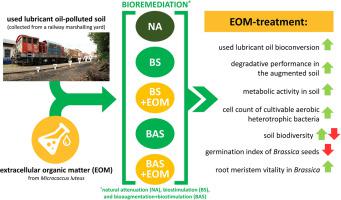Journal of Hazardous Materials ( IF 12.2 ) Pub Date : 2021-05-06 , DOI: 10.1016/j.jhazmat.2021.125996 Attila Bodor 1 , Naila Bounedjoum 2 , Gábor Feigl 3 , Ágnes Duzs 1 , Krisztián Laczi 4 , Árpád Szilágyi 2 , Gábor Rákhely 1 , Katalin Perei 2

|
Chronic pollution by used lubricant oils (ULOs) poses a serious challenge to the environment. Under stress conditions, microorganisms, including potential degraders, can enter a viable but non-culturable (VBNC) state, complicating the bioremediation of ULO-polluted areas. Resuscitation-promoting factors (Rpfs) can reverse this transition and/or enhance the biodegradation performance of both native and augmented strains. Here, Rpf-containing extracellular organic matter (EOM) from Micrococcus luteus was used to enhance the ex situ ULO removal in biostimulated and bioaugmented (with Rhodococcus qingshengii KAG C, R. erythropolis PR4) soils. ULO bioconversion, microbial activity, and CFUs were significantly higher in EOM-treated soils compared to corresponding control soils. After 60 days, the initial ULO concentration (52,500 mg kg−1) was reduced by 37% and 45% with EOM-supplemented biostimulation and bioaugmentation, respectively. Based on high-throughput 16S rRNA analysis, the enhancement was attributable both to the reactivation of EOM-responsive hydrocarbonoclastic bacterial genera (e.g., Pseudomonas, Comamonas, Stenotrophomonas, Gordonia) and to the long-term positive effect of EOM on the degradative efficacy of the introduced rhodococci. Ecotoxicological responses revealed that reduced ULO concentration did not correlate with decreased soil toxicity. Our findings provide an insight into the applicability of EOM in bioremediation and its effects on the soil microbial activity and community composition.
中文翻译:

从胞外有机物开采藤黄微球菌,以增强易地与用过的润滑油污染土壤生物治理的
废润滑油(ULO)造成的慢性污染对环境构成了严峻挑战。在压力条件下,包括潜在降解物在内的微生物可能会进入可行但不可培养的状态(VBNC),使ULO污染地区的生物修复工作复杂化。复苏促进因子(Rpfs)可以逆转这种转变和/或增强天然和增强菌株的生物降解性能。这里,RPF含从细胞外的有机物质(EOM)藤黄微球菌被用来增强易地在biostimulated ULO去除和bioaugmented(与红球菌qingshengii KAG C,R.红球菌PR4)土壤。与相应的对照土壤相比,EOM处理的土壤中的ULO生物转化率,微生物活性和CFU显着更高。60天后,补充EOM的生物刺激和生物强化分别使初始ULO浓度(52,500 mg kg -1)降低了37%和45%。基于高通量16S rRNA分析,该增强可归因于EOM响应的碳氢碎裂细菌属(例如,假单胞菌,Comamonas,Stenotrophomonas,Gordonia)的重新激活。),以及EOM对引入的杜鹃球菌的降解功效的长期积极影响。生态毒理学响应表明,降低的ULO浓度与降低的土壤毒性无关。我们的发现为EOM在生物修复中的适用性及其对土壤微生物活性和群落组成的影响提供了见识。









































 京公网安备 11010802027423号
京公网安备 11010802027423号